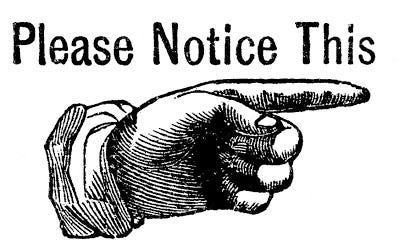Frequency Illusion
You will notice how often people say "yuh" after you read this blog today.
How do I know you'll notice this? It's called the "Frequency Illusion" or the "Baader-Meinhof Phenomenon" which is really a "confirmation bias." Once you pay attention to this thing in your environment, you'll start noticing it everywhere. I count on this as part of my instruction for helping people make changes in their speech and you can, too. You have to feel comfortable to try something that's new to you and if you notice that that's how everyone else is really speaking and they won't notice if you speak that way, you should feel more confident to try it.
For people who are really looking for ways to change how they sound, for any reason, the first thing they have to practice is paying attention.
Attending to speech means not just noticing what was said and understanding the meaning, but also noticing how it was said. This is hard to do if someone is still learning the new language and is translating in their head. It takes a high level of proficiency to be able to notice these two things at once. So try it in situations when the meaning isn't so important for you to remember. Try it in situations when you can anticipate what will be said, for example:
What do you expect the cashier to say when you order coffee?
What do you expect the waiter to say when he first comes to your table?
What do you expect someone to say when you leave?
You should be able to make good guesses about what to expect in these situations.
When people learn a new language, they learn the "formal" way which is often very different than the reality. The formal way is always understood, but it stands out as different to native speakers of the language who make short-cuts and changes. These short-cuts don't change the meaning, so a new language listener interprets these in the way he learned them, in the "formal" way.
For example (stressed words are in bold), say these sentences aloud:
The formal way sounds like it looks, "How are you?"
The actual way sounds different than it looks, "How are yuh?"
Looks like, "See you later"
Sounds like, "See yuh layder" or just, "See yuh"
Looks like, "What do you want?"
Sounds like, "Whuh duh yuh want?"
"You" will change to sound like "yuh" when it's not being stressed (emphasized) because it's not the most important word in the sentence. If you say, "See you" instead of "See yuh" the meaning is understood, but it doesn't sound like the speech of the average native speaker of American English so it catches people's attention as different and could even sound like you're saying, "I see you" which is strange in that context.
For the rest of the day, I want you to pay attention to not just understanding what people mean, but also how they really said it. Then, try it. Imitate what you heard and use it the next time you're in the same situation. Nobody will notice because it will just sound natural, but you'll know your little experiment worked. It doesn't have to be just the "yuh" sound, it could be anything you want to pay attention to.
Today, I want you to:
Observe, listen to how others are really pronouncing everyday phrases
In your head, repeat it, think of how you're going to say that phrase
Try saying it the same way the next time you're in that same situation
Observe their reaction and remember, no reaction = positive feedback (they understood you!)
Here's a good article about the origins of the names for the Frequency Illusion:
You will see Baader-Meinhof everywhere soon



